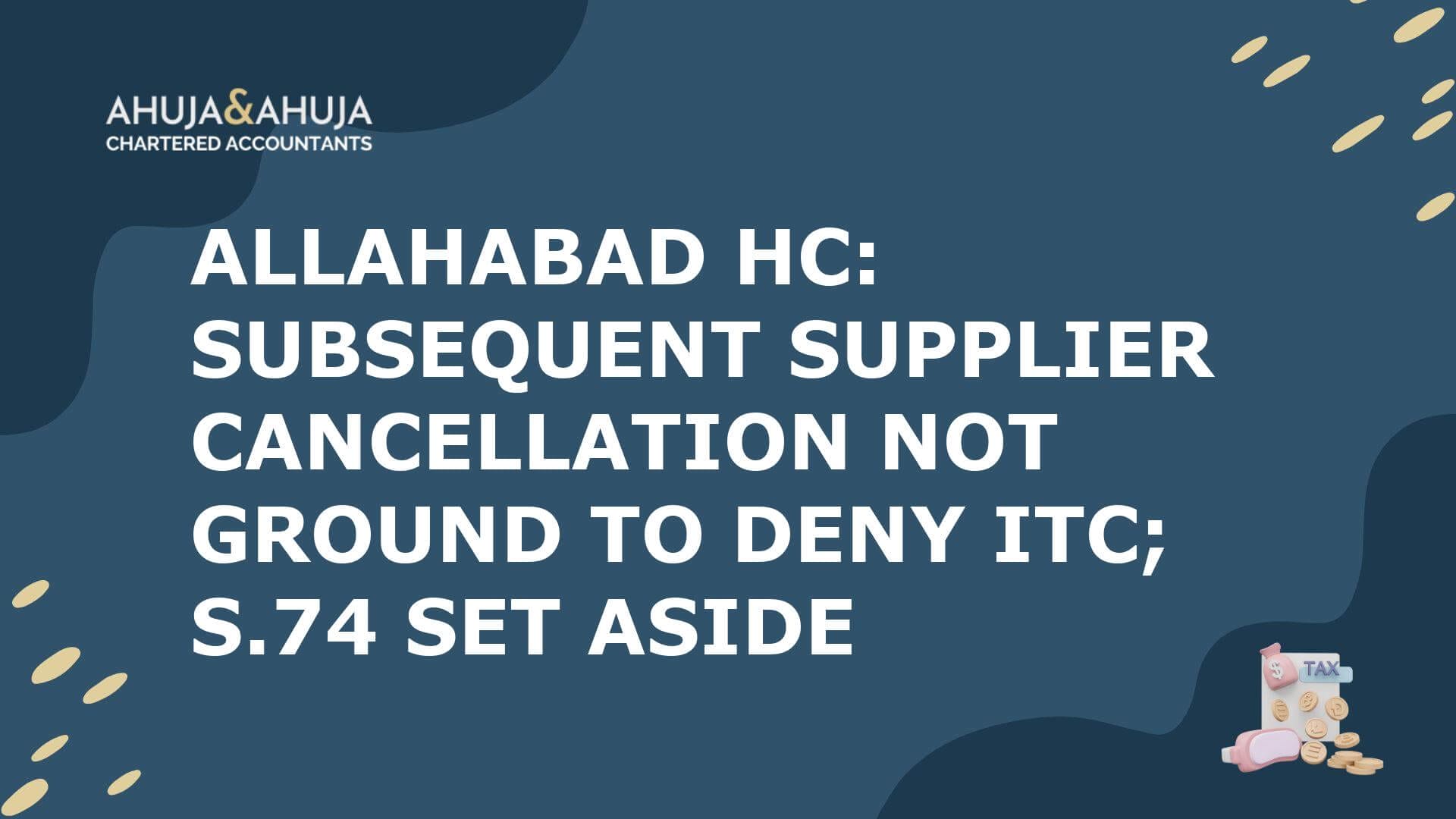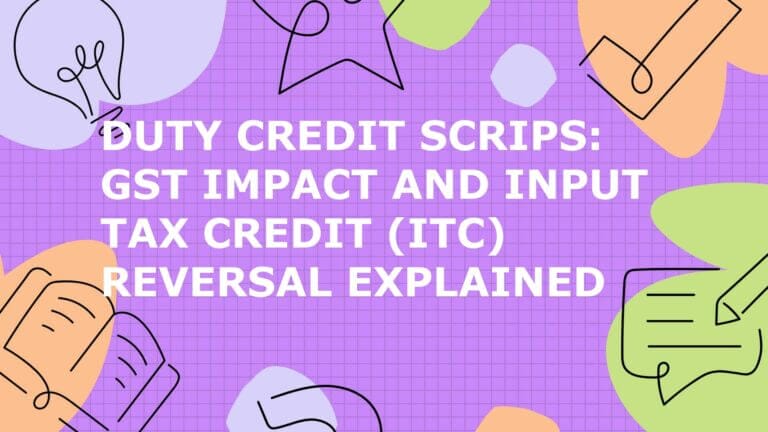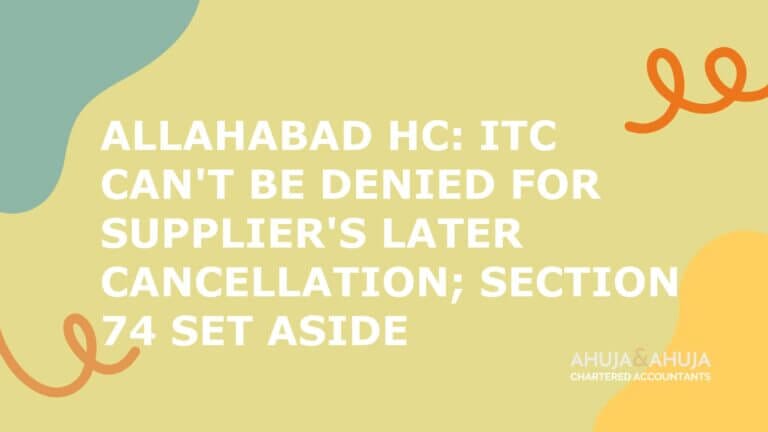Allahabad HC: Subsequent Supplier Cancellation Not Ground to Deny ITC; S.74 Set Aside
Executive Summary
The Allahabad High Court’s decision in Singhal Iron Traders v. Addl. Commissioner (Nov 3, 2025) marks a significant milestone for GST-registered businesses. The Court held that Input Tax Credit (ITC) cannot be denied merely because a supplier’s GST registration was cancelled after the transaction. The ruling quashed both the ITC reversal and penalty imposed under Section 74, clarifying that the burden of proof lies with the Revenue, and that proceedings under Section 74 require evidence of fraud or wilful misstatement—not just “borrowed information” about a supplier’s later deregistration.
For taxpayers, this judgment offers much-needed clarity and protection against arbitrary ITC reversals. It also provides a practical compliance roadmap to help businesses safeguard their legitimate ITC claims and respond effectively to show cause notices (SCNs) and audits.
Legislative Context and Background
Understanding ITC under GST
Input Tax Credit (ITC) is the backbone of the GST regime, allowing businesses to offset the tax paid on purchases against their output tax liability. This mechanism ensures tax is levied only on value addition, preventing cascading.
Supplier Registration at the Time of Supply
A key eligibility condition for availing ITC is that the supplier must be a registered person under GST at the time of the transaction. The law does not require the supplier to remain registered indefinitely—what matters is their status on the date of supply.
Legal Grounds for ITC Reversal: Section 73 vs Section 74
- Section 73 deals with cases where ITC is wrongly availed or utilised due to genuine errors or disputes, without any element of fraud or wilful misstatement.
- Section 74 is invoked for more serious allegations—where the Revenue believes there is fraud, wilful misstatement, or suppression of facts with intent to evade tax. Penalties under this section are stringent. For a detailed explanation, see the blog on Understanding New GST Section 74A.
Common Misuse: “Borrowed Information”
Tax authorities often rely on “borrowed information”—such as a supplier’s later deregistration or findings from other cases—to infer that a transaction was bogus or fraudulent. This shortcut approach can lead to unjust ITC reversals and penalties, even when the purchaser has acted in good faith.
Case Summary: Singhal Iron Traders v. Addl. Commissioner
Fact Paradigm and Grounds for Proceedings
Singhal Iron Traders, a registered dealer in iron scrap, purchased goods from M/s Arvind Metal Suppliers in August 2018. At the time, the supplier was duly registered, and all payments were made through banking channels. The supplier also filed GSTR-1 and GSTR-3B returns for the relevant period.
However, the supplier’s registration was cancelled on 31 January 2019—several months after the transaction. Relying solely on this subsequent cancellation, the Revenue initiated proceedings under Section 74, alleging that the purchases were from a non-existent dealer and thus fraudulent.
Petitioner’s Compliance Steps
The petitioner provided comprehensive documentary evidence:
- GST registration status of the supplier at the time of purchase
- Tax invoices and e-way bills (refer E-Way Bill 2.0: Key Changes)
- Proof of payment through bank
- Confirmation that the supplier filed GSTR-1 and GSTR-3B (implying tax was paid to the government)
Key Findings and Ruling of Allahabad High Court
The High Court found that:
- The supplier was registered and active at the time of the transaction.
- The petitioner had fulfilled all compliance requirements.
- The Revenue failed to verify whether the supplier was non-existent at the time of supply.
- There was no evidence of fraud or misrepresentation by the petitioner.
- Proceedings under Section 74, based only on the supplier’s later deregistration, were unjustified.
The Court quashed the ITC reversal and penalty, reinforcing that legitimate ITC claims cannot be denied on the basis of subsequent supplier cancellation alone.
Ratio Decidendi and Legal Principles Established
Burden of Proof on Revenue
The judgment makes it clear: when denying ITC, the onus is on the Revenue to prove that the supplier was non-existent or that the transaction was fraudulent at the time of supply. Mere reliance on later events or “borrowed information” is insufficient.
Conditions for Valid ITC Claim by Purchaser
A purchaser’s ITC claim stands protected if:
- The supplier was registered on the transaction date
- Payment was made through banking channels (see Mandatory Bank Details Submission in GST)
- Tax invoices and e-way bills are genuine
- The supplier filed GSTR-1 and GSTR-3B, indicating tax was deposited
When is Section 74 Inapplicable?
Section 74 applies only where there is evidence of fraud, wilful misstatement, or suppression of facts. If the purchaser has acted in good faith and complied with all requirements, and there is no proof of collusion or intent to evade tax, Section 74 cannot be invoked.
Limiting the Use of “Borrowed Information”
Authorities must conduct their own verification and cannot rely solely on information about a supplier’s later deregistration to deny ITC. The focus must be on the facts and compliance status at the time of the transaction.
Practical Implications, Compliance Roadmap, and Action Toolkit after Allahabad HC’s Ruling on ITC Denial
Practical Implications for Taxpayers
The Allahabad High Court’s decision is a game-changer for GST-registered businesses facing ITC reversals due to their supplier’s later deregistration. Here’s what it means in practice:
- Authorities must verify facts at the time of transaction: No more knee-jerk ITC denials based on “borrowed information” about a supplier’s later status.
- Section 74 cannot be used as a shortcut: Unless there is clear evidence of fraud or wilful misstatement, proceedings under Section 74 are not justified.
- Precedent for ongoing and future cases: This judgment sets a strong precedent for similar disputes, providing a shield for bona fide taxpayers in audits, SCNs, and appeals.
If you are based in Uttar Pradesh, expert assistance from chartered accountants in Allahabad can help you navigate these complex ITC issues.
Compliance Roadmap: Safeguarding Your ITC Claims
To protect your ITC claims and avoid unnecessary litigation, follow this practical compliance checklist:
Documentation Checklist (At the Time of Transaction)
Supplier Registration Proof
Download and save a GST portal snapshot or registration certificate showing the supplier was registered on the transaction date.Tax Invoice & E-way Bill
Ensure invoices are GST-compliant and e-way bills are generated for applicable transactions.Bank Payment Records
Retain NEFT/RTGS/cheque payment proofs—avoid cash transactions for ITC-eligible purchases.GST Returns Filing
Download GST portal entries showing the supplier filed GSTR-1 and GSTR-3B for the relevant period.Vehicle/Logistics Records
Keep lorry receipts, vehicle registration, and delivery challans, especially for high-value or bulk goods.
Businesses headquartered near Delhi can consult with professionals at Ahuja and Ahuja Delhi office to implement robust GST compliance and audit procedures, including managing ITC claims.
Responding to Adverse Notices: SCNs, Audits, and Appeals
Concise Points for Replying to SCN Alleging ITC Fraud Due to Supplier Deregistration
Supplier’s Registration at Transaction Date
Attach GST portal snapshot/certificate for the relevant date.Banking Channel Payments
Provide bank statements or payment advices.Genuine Documentation
Submit tax invoices, e-way bills, and logistics records.GST Returns Filed
Download and attach supplier’s GSTR-1 and GSTR-3B entries.Cite Allahabad HC Ruling
Reference Singhal Iron Traders v. Addl. Commissioner (2025) and highlight that Section 74 is inapplicable without evidence of fraud.Demand Revenue’s Proof
Ask for specific evidence of fraud, collusion, or misstatement.
If you require assistance with GST audit services or GST litigation, the GST audit services and GST litigation services teams at Ahuja and Ahuja are well-equipped to support you.
C. Section 73 vs Section 74: Quick Decision Matrix
| Basis | Section 73 (No Fraud) | Section 74 (Fraud/Intent) |
|---|---|---|
| Nature of Default | Genuine error/dispute | Fraud, wilful misstatement |
| Penalty | Lower (10%) | Higher (100%) |
| Evidence Required | Bona fide mistake | Proof of intent/collusion |
| Applicability to ITC | Yes, if no fraud | Only if fraud is established |
| Allahabad HC Ruling | Favours taxpayer | Not justified without evidence |
Summary Table: Red Flags, Precedent Safeguards, and Compliance Actions
| Red Flag/Misconception | Judgment’s Safeguard | Compliance Action |
|---|---|---|
| Supplier later deregistered | Not a ground for ITC denial | Keep proof of registration at supply |
| ITC reversal based on “borrowed info” | Revenue must verify facts independently | Demand verification in SCN response |
| Section 74 used without fraud evidence | Section 74 inapplicable without intent/fraud | Highlight bona fide compliance |
| Lack of payment proof | Payment through bank is key | Retain all banking records |
| No e-way bill or logistics proof | Weakens bona fide claim | Maintain all transport documentation |
FAQs: ITC Denial When Supplier Is Later Deregistered
What documents should I keep to prove my supplier was registered?
GST portal snapshot, registration certificate, and supplier’s GSTIN on invoice.Does later cancellation of my supplier’s registration affect my ITC?
No, if the supplier was registered and compliant at the time of supply.What if the supplier files GSTR-1 and GSTR-3B after my purchase?
This supports your bona fide claim, as it shows tax was deposited.Can ITC be denied if I paid through banking channels?
Payment through bank is strong evidence of a genuine transaction.What if I receive an SCN under Section 74 for supplier deregistration?
Respond with all compliance documents and cite the Allahabad HC ruling.How do I monitor my suppliers’ status?
Regularly check the GST portal and maintain a due diligence log.Is Section 74 always applicable for ITC denial?
No, only if there is evidence of fraud or wilful misstatement.What if authorities rely only on “borrowed information”?
Demand independent verification and highlight the court’s directions.How can I use e-way bills and bank records in my defence?
Attach them to your SCN/audit response to prove the transaction’s legitimacy.What immediate steps should I take if I get an adverse notice?
Gather all documents, prepare a pointwise reply, and seek professional advice if needed. You can also consult experts in GST return filing services to ensure compliance.
Conclusion
The Allahabad High Court’s ruling is a major win for honest taxpayers. It draws a clear line: ITC cannot be denied just because a supplier’s registration is cancelled after the transaction, unless there is evidence of fraud or collusion. By maintaining robust documentation and following a diligent compliance process, businesses can confidently defend their ITC claims and reduce the risk of unjust reversals or penalties.
For expert support in Uttar Pradesh or Delhi NCR, consider connecting with chartered accountants in Ghaziabad or Ahuja and Ahuja’s Delhi office.
Appendix: Practical Toolkit
Model Response Draft to Section 74 SCN on Supplier Cancellation
“The supplier was duly registered on the date of transaction, as evidenced by the attached GST portal snapshot and registration certificate. All payments were made through banking channels, and the supplier filed GSTR-1 and GSTR-3B for the relevant period. There is no evidence of fraud or misstatement on my part. As held by the Allahabad High Court in Singhal Iron Traders v. Addl. Commissioner (2025), ITC cannot be denied solely on the basis of subsequent supplier deregistration. I request that the proceedings be dropped.”
Key Takeaway:
Stay proactive, document every step, and remember—the law is on the side of the compliant taxpayer. If you need help with a specific notice or want to audit your ITC documentation, reach out for professional guidance from experts offering GST consultancy services.
Disclaimer
The materials provided herein are solely for educational and informational purposes. No attorney/professional-client relationship is created when you access or use the site or the materials. The information presented on this site does not constitute legal or professional advice and should not be relied upon for such purposes or used as a substitute for professional or legal advice.







